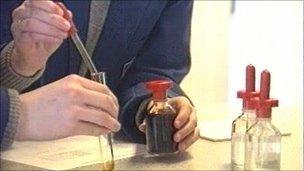Science GCSEs not tough enough - exams watchdog Ofqual
- Published

Single sciences are growing in popularity
England's exams watchdog has suggested two of this year's science GCSEs were too easy.
Ofqual chief executive Isabel Nisbet said the science and additional science exams had "fallen short" of what pupils and teachers should have expected.
She also said there needed to be more consistency in the standards of the various exam boards setting the papers.
But she told the Times Educational Supplement that improvements had been made on previous years.
In a report last year on GCSE standards, Ofqual complained those in science had fallen.
Standards
It has been working with the exam boards which design the papers to make sure that results are "consistent and fair" from year to year and across awarding bodies.
But Ms Nisbet told the TES: "If you asked me 'Is GCSE science good enough?' I think the answer would be 'No'."
"I think we have made some progress in toughening up the standards and reducing the disparities but we still have a bit to go."
Nearly 450,000 pupils took the science GCSE in England, Wales and Northern Ireland this year and 352,000 took the harder additional science GCSE.
Numbers of entries for both were down on last year, while numbers taking separate GCSEs in biology, chemistry and physics rose dramatically, by roughly 30%.
In terms of results, slightly fewer entries (as a percentage) were awarded the top A and A* grades than last year in science and additional science.
But there was an overall increase in the percentage getting a "good pass" - between an A* and a C.
The single sciences followed a similar pattern.
Ms Nisbet sought to reassure students: "What [pupils and teachers] should know is that their exams have been fairly and consistently marked, rigorously checked, and therefore if they get a C or a B or an A, this is a real achievement.
"They should not feel devalued by what has been a perfectly legitimate, finely tuned criticism at a level of sophistication which many countries would just not recognise," she told the TES.
Consistent standards
The AQA exam board said it had been asked to lower its standards in 2008 - and called on Ofqual to look at standards between different types of qualifications.
In a statement, it said: "Ofqual asked AQA to lower its standards in 2008 to come more into line with the other awarding bodies and that it was AQA's 2008 standard which the other awarding bodies were expected to follow in 2009."
"Consistency of standards across awarding bodies and across qualifications is essential so that teachers don't have to compromise and make a choice between getting good examination results and the genuine development and achievement of their students."
The OCR exam body said: "The five GCSE exam boards are working hard with the regulator to address the challenges posed by the current GCSEs - even though they were originally approved by that regulator. It's taking some time because modular qualifications take longer to amend as students have already taken some units - as Ofqual has stated.
"Whatever the problems with all the boards' exams, the syllabuses do enable students to learn good science - as the A-level results demonstrated. OCR's syllabuses were designed in association with universities and science experts. New syllabuses are expected to come in for first teaching next year."